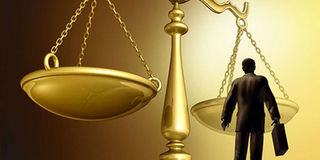Tribute to critical readers who keep journalists on their toes

He does not let journalists say anything that is untrue, unfair or biased on issues regarding public transport safety and related matters. PHOTO | FILE | NATION MEDIA GROUP
What you need to know:
- How journalists relate with their readers and audiences is one of the best ways of earning the trust of the public.
- Journalists, editors and the media need to offer opportunities to readers to criticise what they read, hear and see.
It was 20 minutes past one o’clock when Wilson Kago called on November 19 last year to complain.
“Mr Editor,” he said, “my nephew got 421 marks in the just concluded KCPE and his name is not among those listed (in today’s paper) with the same score. Why?”
I could not find an editor with a ready-made answer that could satisfy the sceptical complainant, apart from the explanation that there were so many of them they could not accommodate everybody.
Never before has there been in Kenya such media consumers like Mr Kago. They are so active, empowered, questioning, critical and fault-finding, even sometimes censorious.
Today’s media consumers exercise some degree of power in the journalism process.
Today, I’m celebrating those readers like Mr Kago who aid the public editor’s efforts to keep our journalism honest and transparent.
RELATIONSHIPS
They challenge and find fault with some of the news we publish and are amazingly media literate and prolific in their criticisms and critiques.
Mr Kago’s criticisms, for example, total 19 received by telephone since March 16, 2015 to date. They range from the way the Daily Nation covered a gay wedding to the use of multiple pictures of a politician in the same issue.
It’s invidious to single out Mr Kago for mention because there are many others like him who participate critically in our journalism process.
But I’ve picked his name randomly. I’ll mention a few of them, again randomly.
But before I do that it’s important to emphasise why I’m celebrating Mr Kago and other reader-critics. It’s all because of relationships.
How journalists relate with their readers and audiences is one of the best ways of earning the trust of the public — by being truthful and transparent about their work and respecting the views of readers who seek a sense of ownership, inclusion and accountability in the journalism process.
PROFESSIONALISM
Journalists, editors and the media need to offer opportunities to readers to criticise what they read, hear and see.
They must entertain readers’ criticisms including requests to have errors and mistakes corrected.
As Bill Kovach and Tom Rosenstiel state in their influential book, The Elements of Journalism, “If journalists are truth seekers, it must follow that they be honest and truthful with their audiences, too.”
Back to our readers who keep our journalists and editors on their toes. Because of space limitations, I will mention only two others.
Prof Caxton Muru Muune quickly comes to mind. A transport engineer, he stands out as an area specialist critic and because he pulls no punches.
He does not let journalists say anything that is untrue, unfair or biased on issues regarding public transport safety and related matters.
That is not to say he is always right. He is also quick to congratulate journalists for work well done.
I call him professor. His eloquence and sharp brain bely his bearded and shaggy appearance.
TRUTHFUL
Then there is the one and only Abu Ayman Abusufian of Jamia Mosque in Nairobi.
He does not let our journalists get away with Islamophobia. For example, commenting on the January 25, 2019 special edition of the NTV Sasa show hosted by Salim Swaleh and Jane Ngoiri to discuss the Dusit Hotel complex terrorist attack, he said security expert Simiyu Werunga said things that had the potential to foster animosity and prejudice against Muslims and members of the Somali community.
“Because of its influential role, the media should be at the frontline to rally Kenyans to strongly safeguard the country’s diverse religious and cohesive structure and avoid being used as a platform for promoting ethnic and religious hatred among Kenyans.”
Messrs Kago, Muune and Abusufian and readers like them help to keep our editors and journalists transparent and truthful.
Send your complaints to [email protected]. Call or text 0721 989 264



